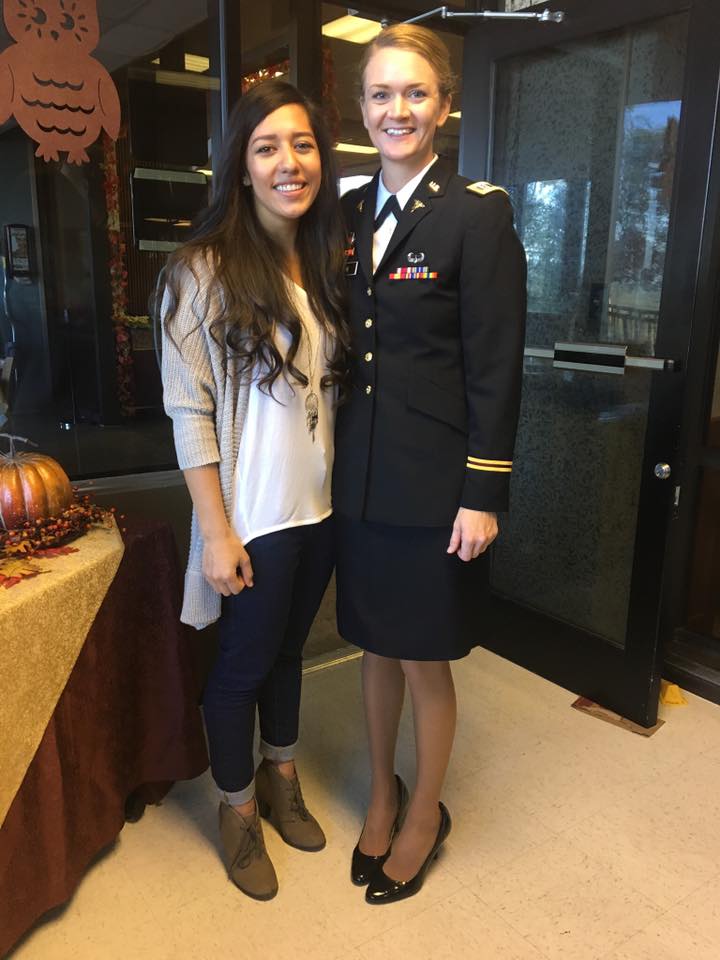MMAA Pride Profile: Michelle Nicole
By Emily Starbuck Gerson
Michelle Nicole enlisted in the Air Force during Don’t Ask, Don’t Tell, which forced her to keep her identity as a lesbian secret at first. Eventually, she was able to come out and live authentically. Nicole recently separated from the Air Force as a Technical Sergeant and works as a civilian, though she now serves a different role in the military: she married her wife, an Army officer. The couple is preparing to PCS from San Antonio, Texas, to Washington State.
Modern Military Association of Amierca: When did you join the military, and did you already know you were lesbian at the time?
Michelle Nicole: I joined the military in November 2009 from Anchorage, Alaska. I knew I was gay in the first grade (age 6), which takes a lot of people by surprise because it seems so young to declare your sexual orientation, but when you know, you know. Her name was Maurine Chambers and she was a second grader in my mixed class. Ugh! I was so in love with her.
MMAA: What was it like enlisting during Don’t Ask, Don’t Tell? What were some of the challenges and fears you experienced as you served in silence?
MN: I remember going to the MEPS station to begin in-processing in early 2009. I wasn’t too intimidated about going through the process until I had to go over the contents of my contract. In the contract was a clause about homosexual activity, and that was when my stomach hit the floor.
I’d been training to be straight my whole life due to my Hispanic heritage and religious upbringing as a Jehovah’s Witnesses, but this felt different. I’d never seen an official document, especially a DoD one, that spelled out what homosexual behavior was and the real-life consequences if caught. I signed those papers unsure If I was going to be safe from DADT.
There were so many challenges that I had no idea would even be an issue. I felt like I couldn’t speak up when I saw LGBT discrimination or harassment amongst my peers out of fear that they would target me next. I made sure to limit my female relationships and exploit my male relationships to create a perception of heterosexuality.
I didn’t understand until later in life that I hurt a lot of people by selling a false version of myself. I missed out on a lot of potentially great friendships. Looking back, I feel so sad for that girl who had to lie and hide to protect her secret.
MMAA: How did you feel when DADT was repealed?
MN: When Don’t Ask Don’t Tell was repealed, I didn’t think anything would really change for me. Sure, I wouldn’t get kicked out of the military, but it wouldn’t change the way people see and treat me. I didn’t have proof to back up my theory, but a quick look at American history goes to show how progressive policies like abolishing slavery, segregation and women’s rights are not fixed by legislative policies alone. I was still scared and relied on the other LGBT service members to help pave a path for me because I knew at the time I couldn’t bear it.
You’ve been a huge ally for trans troops in their fight to serve openly. Why was it important to you to stand up for them?
MN: When I see my trans brothers and sisters being targeted for simply being their authentic selves, it reminds me of my time during DADT. To ask someone to live a lie out of fear of retribution is the heaviest burden I’ve ever experienced.
Only 24% of the population are eligible to serve and only 1% volunteer to serve. Why would we want to make it more difficult to recruit dedicated members? All of the trans military members I’ve worked with in the military are amazing. Filtering them out based on the eligibility pool is an unnecessary loss of talented and dedicated Americans.
Now that you’ve both left the Air Force and married into the Army, what has it been like being on the other side as an active duty military spouse?
MN: Things are going well on the other side. I haven’t had issues receiving the support and care that military spouses are privileged to. The processes are in place now to make sure same-sex couples are treated the same as their heterosexual counterparts, but it took time.
The same cannot be said about the human factor. People are going to have their own opinions and attitudes towards my wife and I, and we deal with it as it presents itself. I will say I’ve become more outspoken since leaving active duty service and speak up for myself and others whenever necessary.
What do you think the military can do to be more inclusive and supportive of LGBTQ service members and their families?
MN: The military needs to make sure service members are informed on policy and guidance as it relates to LGBTQ awareness. I still hear people using language like “transexual,”“whatever they are,” “homo,” etc. We cannot be the judge on what fuels this kind of language and behavior, but we can start by educating them.
© Copyright modern military association | EIN 52-1845000 | all rights reserved | legal & Financial
